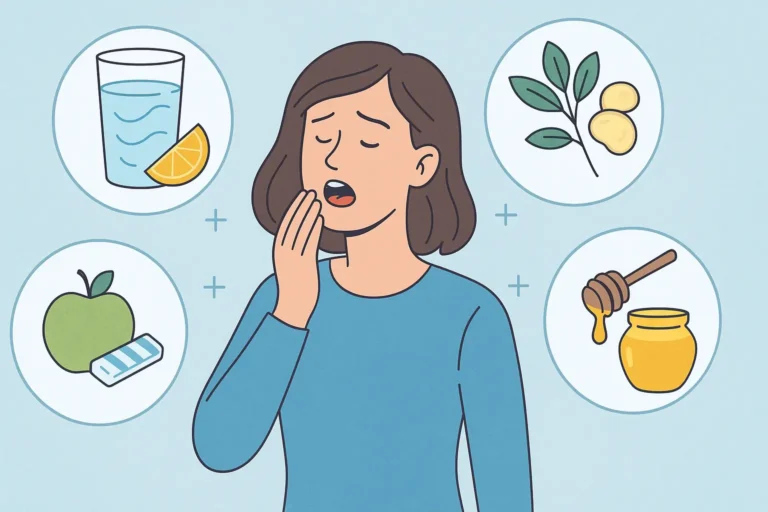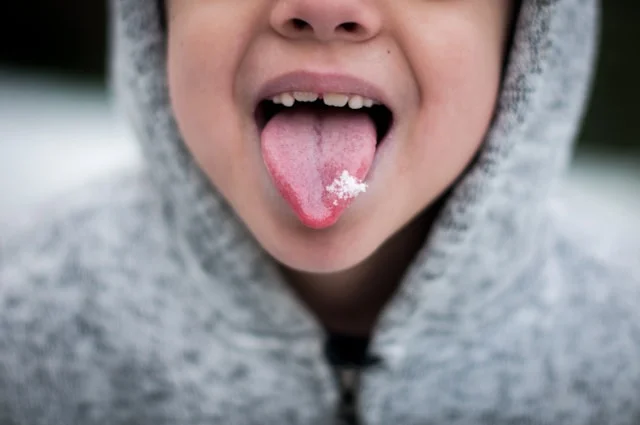Ayurvedic Remedies for Dry Mouth: 7 Effective Methods
Why this question matters (and what “dry mouth” really is)
If you’ve ever felt that sticky, uncomfortable dryness in your mouth — especially overnight, or when you’re stressed — that’s called xerostomia (dry mouth). It can make swallowing, speaking, tasting, and even sleeping unpleasant.
Modern medicine offers treatments (like saliva substitutes, medications, etc.), but many people prefer gentler, natural approaches — especially based on Ayurveda.
But here’s the catch: many resources throw out vague “drink more water” advice or random herb lists. What I want to do here is cut through the fluff and show you specific, practical Ayurvedic remedies you can try safely — plus what to watch out for.
Important disclaimer: Always check with your doctor (or ayurvedic practitioner) before using any herb, especially if you have underlying health conditions, are pregnant, or are on medications.
The Ayurvedic view: what causes dry mouth (in their model)
Before we dive into remedies, it helps to understand Ayurveda’s framework. That way the remedies make more sense (and you can pick what fits you).
- Ayurveda sees dryness as a sign of Vata aggravation, often mixed with Pitta heat. When Vata is high, it dries up bodily fluids (like saliva). When Pitta is high, the heat burns or dehydrates.
- So in Ayurvedic logic, a good remedy will pacify Vata (cooling, lubricating) and balance Pitta (cooling, calming) at the same time.
- Also, Ayurveda looks at diet, lifestyle, herbs, and oral practices (dinacharya) — it’s not just “take a pill.”
When you see a remedy below, think: Does this help with dryness / heat / restoring moisture?
7 Ayurvedic Remedies for Dry Mouth (and how to use them)
Here’s a list of the most promising Ayurvedic remedies with instructions, plus notes on safety and what to expect.
1. Oil pulling (Gandusha / Kavala)
One of the classic oral practices in Ayurveda. You swish oil in your mouth to lubricate tissues, remove toxins, and stimulate the salivary glands.
- Use a light edible oil like coconut oil or sesame oil.
- Take about ½ to 1 teaspoon of oil, swish between teeth and around gums for 2–5 minutes (you can build up to 10 minutes if comfortable).
- Spit it out (not into sink, to avoid clogging drains).
- Then rinse with warm water and spit.
Why it helps: Oil pulling lubricates dry oral tissues, can reduce harmful bacteria, and keeps your mouth environment more moist. (rdhmag.com)
Tips:
- Do this in the morning before eating or drinking.
- Don’t swallow the oil.
- Start with 1 minute if you’re new, increase gradually.
2. Ginger / Aloe vera mouthwash (herbal rinse)
Clinical studies suggest that certain herbal mouth rinses significantly reduce symptoms of dry mouth (xerostomia). In particular:
- A 25 % ginger mouthwash used 20 mL, three times a day for 14 days, produced noticeable relief. (PMC)
- Similarly, a 50 % aloe vera mouthwash (same dosage) also reduced dry mouth symptoms in a study. (PMC)
How to make & use:
- For ginger: slice or grate fresh ginger, steep in hot (not boiling) water, strain to get your “rinse.” You might mix with a little cooled water or herbal tea.
- For aloe: use pure aloe juice (not heavily processed juice with sugar). Dilute with water to about half-and-half (50 %) and use as a mouth rinse.
- Swish 20 mL in the mouth for ~30 seconds, spit, repeat 2–3 times daily.
Cautions:
- Don’t use ginger rinse if you have ulcers or very sensitive mucosa (it may sting).
- Use pure aloe without additives.
3. Licorice (Yashtimadhu / Mulethi) — for its “moistening” effect
Ayurvedic sources often recommend Yashtimadhu (licorice root) when dryness is the problem.
- It is considered “Snigdha” (oily) and soothing — great for pacifying Vata dryness.
- It’s used in powder or decoction form to moisten tissues. (Ask Ayurveda)
Usage example:
- Make a mild decoction: ½ teaspoon licorice powder in a cup of warm water, simmer for a few minutes, strain.
- Use as a mouthwash (swish and spit).
- Or mix with a little honey (if your Pitta is not high) and apply to dry patches.
Caution: Licorice (especially in larger doses) can raise blood pressure or affect potassium levels — do not overuse, especially if you have hypertension or kidney issues.
4. Triphala combination
Triphala is a classic Ayurvedic herbal formula (amla, bibhitaki, haritaki). It’s considered tridoshic (usable in many constitutions) and helpful for digestion, detox, and mucous membrane health.
- Ayurveda sources say Triphala helps balance doshas, remove toxins, and thus indirectly help dryness by improving systemic health. (Ask Ayurveda)
- You might use it as a mild oral rinse (diluted) or take it internally (if your digestive system tolerates it).
Usage idea:
- Oral rinse: Dissolve a pinch of Triphala powder in warm water, stir well, cool, then swish lightly in your mouth.
- Internal: Take ½ to 1 teaspoon at night with warm water (only if your digestion is okay with it).
Note: Always start with a small dose if you’re new to Triphala; it can act as a mild laxative in sensitive individuals.
5. Lemon / citrus stimulation (in moderation)
Ayurvedic texts sometimes recommend lemon juice as a saliva stimulant. (Easy Ayurveda Hospital)
- A few drops of fresh lemon juice in warm water can encourage saliva flow.
- You can swish diluted lemon water in your mouth (briefly) — but don’t linger too long (acid can erode enamel).
Best use: As a quick “saliva trigger” rather than long-term solution. Use only occasionally, and always rinse with plain water after.
6. Corriander (cilantro) rinse
Some Ayurvedic and herbal resources suggest coriander seeds boiled in water make a soothing rinse for dryness and oral comfort. (drjasnasayurveda.com)
How to use:
- Boil 1 teaspoon coriander seeds in ~1 cup water for maybe 10 minutes.
- Strain and let it cool.
- Use as a mouth rinse 2–3 times daily.
This can soothe oral tissues, reduce thirst sensation, and mildly refresh.
7. Lifestyle + diet adjustments (Ayurvedic daily habits)
Even the best herbs won’t fully work if your daily habits are constantly triggering dryness. Here are things you can do:
| Adjustment | Why it helps | What to do |
|---|---|---|
| Sip warm water often (not cold) | Cold constricts, warmth relaxes and lubricates | Carry a flask of warm water; take small sips during the day |
| Avoid dry, hot, spicy food | These aggravate Vata/Pitta and further dry tissues | Choose warm, moist, semi-liquid meals |
| Use a humidifier / steam inhalation | Moist air supports mucous membranes | Run a humidifier at night; inhale warm steam before bed |
| Chew fennel seeds or soaked raisins | Natural oral lubricant + mild stimulation | Chew a few seeds or raisins mid-meal or after meals |
| Sleep with mouth closed (if possible) | Mouth breathing dries the mouth quickly | Use nasal strips, correct nasal congestion |
| Avoid caffeine, excessive salt, alcohol | These tend to dehydrate | Moderate or eliminate them |
These habits align with Ayurvedic dinacharya (daily routine) to maintain balance.
Which remedy should you start with?
If you’re new to Ayurvedic remedies for dry mouth, here’s a simple step-by-step:
- Begin with oil pulling (coconut or sesame) daily for 2–3 minutes.
- Add a herbal rinse (ginger or aloe) once or twice a day.
- If dryness persists, introduce licorice rinse (in small dose).
- Watch your diet and daily habits: avoid spicy, dry foods, sip water, use humidifier.
Keep a simple journal: note how your mouth feels in morning, mid-day, and evening. Which remedies seem to help? Adjust accordingly.
Possible side effects & cautions
- Herb–drug interactions: Licorice in large doses can affect blood pressure, potassium levels. Ginger (in rinse) might irritate sensitive mucosa.
- Overuse of acidic rinses: Lemon or strong herbal acids can erode enamel.
- Allergies / sensitivity: Always test a small amount first.
- Underlying medical cause: If your dry mouth is caused by medications (antihistamines, antidepressants, etc.), autoimmune disease (e.g. Sjögren’s), or radiation therapy, herbs can help symptomatically — but won’t fully solve the root cause.
- Pregnancy / health conditions: Consult your healthcare provider before applying herbs internally (some are contraindicated in pregnancy, high blood pressure, kidney issues, etc.)
Realistic expectations & timeframe
- Herbal and Ayurvedic remedies tend to provide gradual relief, not instant cure.
- You might feel subtle improvement in 3–7 days (less “stickiness,” more comfort).
- For severe or chronic cases, herbs may support but not fully replace medical therapies.
- Consistency is key — doing rituals just once won’t help — you’ll need daily practice for a few weeks to judge effect.
Sample daily protocol (beginner-friendly version)
Here’s one routine you can try for 7–14 days:
| Time | Action |
|---|---|
| Morning (before food) | Oil pull (½ tsp coconut oil, 2–3 min), spit, rinse with warm water |
| After breakfast | Swish aloe or ginger rinse (20 mL diluted) for 30 sec, spit |
| Mid-morning | Sip warm water or chew soaked raisins / fennel seeds |
| Lunch | Eat a moist, warming meal with cooked vegetables, avoid hot dry snacks |
| Afternoon | Rinse mouth with warm water; again herbal rinse if needed |
| Evening (after dinner) | Use coriander seed rinse or mild licorice rinse; short oil pull |
| Night (before sleep) | Humidifier in room, nasal passages clear, sip warm water if awakened |
Adjust based on how your mouth feels. If a remedy causes irritation, stop it.
Success story + tips from “on-the-ground” users
- Many people report that oil pulling is the first thing they notice helps — the mouth feels less parched.
- Some combine oil pulling with ginger mouthwash and claim “less need to sip water at night.”
- A tip: if the oil suddenly feels “too thick,” you may be generating more saliva — a good sign.
- Another trick: after oil pulling, wait 5 minutes before brushing your teeth, to let the moisture settle.
Over time, folks taper off—doing oil pulling every other day once dryness improves.
Summary: how to use Ayurvedic remedies for dry mouth right
- Dry mouth often stems from Vata + Pitta imbalance in Ayurveda.
- Effective Ayurvedic remedies are moisturizing, cooling, and gentle — not harsh, drying herbs.
- Start with oil pulling, herbal rinses (ginger / aloe), and licorice in low doses.
- Pair with good habits: avoid dehydrating foods, keep your environment moist, sip warm fluids.
- Always monitor how your body responds, and pause if something irritates you.
- For persistent or severe cases, consult a qualified Ayurvedic practitioner or dentist to rule out medical causes.







